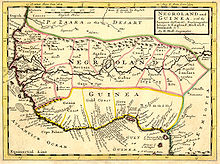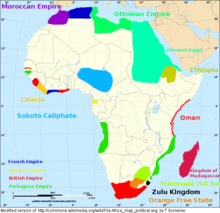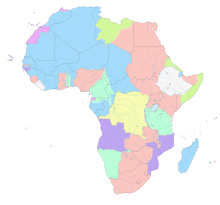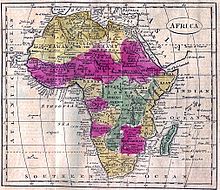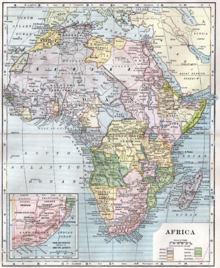- Colonisation of Africa
-
The colonisation of Africa has a long history, the most famous phase being the European Scramble for Africa during the late 19th and early 20th century.
Contents
Ancient colonisation
North Africa experienced colonisation from Europe and Western Asia in the early historical period, particularly Greeks and Phoenicians.
Under Egypt's Pharaoh Amasis (570-526 BCE) a Greek mercantile colony was established at Naucratis, some fifty miles from the later Alexandria.[1] Greeks also colonised Cyrenaica around the same time.[2] There was also an attempt in 513 BC to establish a Greek colony between Cyrene and Carthage that resulted in the combined local and Carthaginian expulsion two years later of the Greek colonists.[3]
Alexander the Great (356-323 BC) founded Alexandria during his conquest of Egypt. This became one of the major cities of Hellenistic and Roman times.
Phoenicians founded a number of colonies along the North African coast. Some of these were founded relatively early. Utica, for example, was founded c. 1100 BC. Carthage, which means New City, has a traditional foundation date of 801 BC. It was established in what is now Tunisia and became a major power in the Mediterranean by the 4th century BC. The Carthaginians themselves sent out expeditions to explore and establish colonies along Africa's Atlantic coast. A surviving account of such is that of Hanno which Harden who quotes it places at c. 425 BC.[4]
Carthage encountered and struggled with the Romans. After the third and final war between them, the Third Punic War (150-146 BCE), Rome completely destroyed Carthage. Scullard (p. 37, 150, 216) mentions plans by such as Gaius Gracchus in the late 2nd century BC, Julius Caesar and Augustus in the mid and late 1st century BC to establish a new Roman colony near the same site. This was established and under Augustus served as the capital city of the Roman province of Africa.[5]
Gothic Vandals briefly established a kingdom there in the 5th century, which shortly thereafter fell to the Romans again, this time the Byzantines. The whole of Roman/Byzantine North Africa eventually fell to the Arabs in the 7th century, who brought the Islamic religion and Arabic language (see History of Islam).
Early modern period
Main article: European exploration of AfricaFrom the 7th century, Arab trade with sub-Saharan Africa led to a gradual colonisation of East Africa, around Zanzibar and other bases. Although trans-Saharan trade led to a small number of West African cities developing Arab quarters, these were not intended as colonies, and while Morocco attempted to conquer areas of the Sahel in the Moroccan war, it was soon forced to withdraw its troops after pillaging the area.
Early European expeditions concentrated on colonising previously uninhabited islands such as the Cape Verdes and Sao Tome Island, or establishing coastal forts as a base for trade. These forts often developed areas of influence along coastal strips, but (with the exception of the River Senegal), the vast interior of Africa was not colonised and indeed little-known to Europeans until the late 19th century.
Vincent Khapoya mentions Ali Masrui's three interrelated broad reasons for European exploration of Africa: to increase knowledge, to spread Christianity and to increase national esteem.[6] Khapoya continues with a listing of reasons ("political/strategic, cultural and economic") for colonialism.[7]
The Scramble for Africa
Main article: Scramble for AfricaEstablished empires, notably Britain, Portugal and France, had already claimed for themselves vast areas of Africa and Asia, and emerging imperial powers like Italy and Germany had done likewise on a smaller scale. With the dismissal of the aging Chancellor Bismarck by Kaiser Wilhelm II, the relatively orderly colonisation became a frantic scramble. The 1885 Berlin Conference, initiated by Bismarck to establish international guidelines for the acquisition of African territory, formalised this "New Imperialism". Between the Franco-Prussian War and the Great War, Europe added almost 9 million square miles (23,000,000 km²) — one-fifth of the land area of the globe — to its overseas colonial possessions.
Vincent Khapoya notes the great self esteem some European states felt at possessing territory many times larger than themselves. He adds the significant contribution made by Africans to struggle among the great powers. He states that one million people of African descent fought for the Allies in World War One and two million in World War Two.[8]
The Europeans possessed attitudes of superiority and a sense of mission. Khapoya compares and contrasts three colonial powers: the French, the British and the Portuguese. The French were able to accept an African as French, if they gave up their African culture and adopted French ways, even including marriage with a (white) French person. The British did not accept full equality even for an African adopting British ways, and disapproved of interracial marriage. The Portuguese were more tolerant than the British concerning mixed marriages, though still viewing full blooded Portuguese as superior. Knowledge of Portuguese language and culture and abandonment of traditional ways defined one as civilized.
Khapoya considers the colonisers' administrative styles. "The French, the Portuguese, the Germans and the Belgians exercised a highly centralized type of administration called 'direct rule.'" The British sought to rule by identifying local power holders and encouraging or forcing these to administer for the British Empire. This was indirect rule.[9]
France ruled from France, appointing chiefs individuals without considering traditional criteria, but rather loyalty to France. France established two large colonial federations in Africa, French West Africa and French Equatorial Africa. France appointed officials, passed laws and had to approve any measures passed by colonial assemblies.
East Africans resisted German enforced labour and taxation. The Germans were almost driven out of the area in 1888.[10] A decade later the colony seemed conquered, though, "It had been a long drawn-out struggle and inland administration centres were in reality little more than a series of small military fortresses." In 1905 the Germans were astonished by a widely supported uprising. At first this was successful. Within a year this was suppressed by reinforcing troops armed with machine guns. German attempts to seize control in Southwest Africa also produced ardent resistance which was very forcefully put down.[11]
King Leopold II of Belgium called his vast private colony the Congo Free State. Effectively this meant those exploiting the area were free of all restraint and answerable only to the Belgian king.[12] The treatment of the Africans under this system was harsh enough to cause the other colonial powers to plead with the Belgian king to exercise some moderating influence. Eventually the Belgian government annexed the territory as a Belgian colony.[13]
"Belgian colonial rule saw massive transfers of wealth from Zaire [the Belgian Congo] to Belgium. Africans received only limited education, which would allow them to read the Bible, take orders efficiently from the missionaries, and function, at best, as clerks in the colonial bureaucracy." (p. 132) Khapoya notes that in 1960 Zaire had a relatively high literacy rate and one college graduate.[14]
As Khapoya discusses (pp. 134–143) all colonial powers exercised significant attention to the economics of the situation. This included: acquisition of land, enforced labour, introduction of cash crops, even to the neglect of food crops, halting inter-African trading patterns of pre-colonial times, introduction of labourers from India, etc. and the continuation of Africa as a source of raw materials for European industry, therefore a continent not to be industrialised.[15]
Decolonisation
Main article: Decolonisation of AfricaVincent Khapoya (p. 148f) notes the significant resistance imperialist powers faced to their domination in Africa. Technical superiority enabled conquest and control. Africans recognized the value of European education in dealing with Europeans in Africa. They noticed the discrepancy between Christian teaching of universal brotherhood and the treatment they received from missionaries. Some established their own churches. Africans also noticed the unequal evidences of gratitude they received for their efforts to support Imperialist countries during the world wars:[16]
"Many British veterans were rewarded for their part in saving Britain and her empire with generous pensions and offers of nearly free land in the colonies. The African soldiers were given handshakes and train tickets for the journey back home. They could keep their khaki uniforms and nothing else. These African soldiers, after returning home, were willing to use their new skills to assist nationalist movements fighting for freedom that were beginning to take shape in the colonies." (p. 158)[17]
Vincent Khapoya notes that while European imposed borders did not correspond to traditional territories, such new territories provided entities to focus efforts by movements for increased political voice up to independence. Among local groups so concerned were professionals such as lawyers and doctors, the petite bourgeoisie (clerks, teachers, small merchants), urban workers, cash crop farmers, peasant farmers, etc. Trade unions and other initially non political associations evolved into political movements.
Khapoya (p. 177f) describes the differences in gaining independence by British and French colonies. Britain sought to follow a process of gradual transfer of power. The French policy of assimilation faced some resentment, especially in North Africa.[18] Shillington (p. 380f) describes the granting of independence in March 1956 to Morocco and Tunisia to allow concentration on Algeria where there was a long (1954–1962) and bloody armed struggle to achieve independence.[19] Khapoya writes (p. 183) that when President de Gaulle in 1958 held a referendum in its African colonies on the issue, only Guinea voted for outright independence. Nevertheless in 1959 France amended the constitution to allow other colonies this option.
As Shillington describes (p. 385f) farmers in British East Africa were upset by attempts to take their land and to impose agricultural methods against their wishes and experience. In Tanganyika, Julius Nyerere exerted influence not only among Africans, united by the common Swahili language, but also on some White leaders whose disproportionate voice under a racially weighted constitution was significant. He became leader of an independent Tanganyika in 1961. In Kenya Whites had evicted African tenant farmers in the 1930s. Since the 40s there had been conflict. This intensified in 1952. By 1955 Britain had suppressed the revolt. By 1960 Britain accepted the principle of African majority rule. Kenya became independent three years later.[20]
Shillington (p. 391f) vividly portrays Belgium's initial opposition to independence, the demands by some urban Africans, the 1957 and 1958 local elections meant to calm this dissatisfaction, the general unrest that swept the colony, the rapid granting of independence and the civil strife that ensued.[21]
The main period of decolonisation in Africa began after World War II. Growing independence movements, indigenous political parties and trade unions coupled with pressure from within the imperialist powers and from the United States ensured the decolonisation of virtually the whole of the continent by 1980. While some areas, in particular South Africa, retain a large population of European descent, only the Spanish enclaves of Ceuta and Melilla and the islands of Réunion, the Canary Islands and Madeira remain under European control.
See also
Notes
- ^ Boardman, The Greeks Overseas, Penguin, Harmondsworth 1973 (1964) p. 114
- ^ Boardman op. cit. p. 151f
- ^ Boardman op. cit. p. 208
- ^ Harden, Donald, The Phoenicians, Penguin, Harmondsworth, 1971 (1962) pp 163-168
- ^ Scullard, H.H. From the Gracchi to Nero, Methuen, London, 1976 (1963) pp. 37, 150, 216
- ^ Khapoya, Vincent B., The African Experience, Prentice Hall, 1998 (1994) p. 112
- ^ Khapoya, op. cit. p. 114
- ^ Khapoya op. cit. p. 115f
- ^ Khapoya, op. cit. p. 126f
- ^ Shillington, Kevin, History of Africa, St. Martin's Press, New York, 1995 (1989)
- ^ Shillington, Kevin, op. cit. p. 340f
- ^ Khapoya, op. cit. p. 131
- ^ ibid
- ^ Khapoya, op. cit. p. 132
- ^ Khapoya, op. cit. pp. 134-143
- ^ Khapoya, op. cit. p. 148f
- ^ Khapoya, op. cit. p. 158
- ^ Khapoya, op. cit. p. 177f
- ^ Shillington, op. cit. p. 380f
- ^ Shillington, op. cit. p. 385f
- ^ Shillington, oop. cit. p. 391f
References
- John Boardman, The Greeks Overseas, Penguin, Harmondsworth, 1973 (1964)
- Michael Crowther, The Story of Nigeria, Faber and Faber, London, 1978 (1962)
- Basil Davidson, The African Past, Penguin, Harmondsworth, 1966 (1964)
- Donald Harden, The Phoenicians, Penguin, Harmondsworth, 1971 (1962)
- Vincent B. Khapoya, The African Experience, Prentice Hall, Upper Saddle River, NJ, 1998 (1994)
- H.H. Scullard, From the Gracchi to Nero, Methuen and Co., London, 1976 (1959)
- Kevin Shillington, History of Africa, St. Martin's Press, New York, 1995 (1989)
External links
- Germany Refuses to Apologize for Herero Holocaust - from Africana.com
- Belgium exhumes its colonial demons - from guardian.co.uk
- An article on the continuing effects of the colonisation of Africa
Africa topics Culture Architecture · Art · Cinema (Films · Film festivals) · Cuisine · Etiquette · Languages · Literature (Writers by country) · Music (Musicians) · Religion · World Heritage SitesDemographics People · Countries by population density · HIV/AIDS · Urbanization (Cities · Largest metropolitan areas) · EmigrationEconomy Countries by GDP (nominal) · Countries by HDI · Central banks and currencies · Education · Internet · Natural resources · Poverty · Renewable energy · Stock exchangesGeography History Politics African Union · Elections · Heads of government · Heads of state · International organisations (under construcion) · Pan-African Parliament
· Political parties · Human rights · Pan-Africanism · United States of AfricaSociety Sport Years 2004 in Africa · 2005 in Africa · 2006 in Africa · 2007 in Africa · 2008 in Africa · 2009 in Africa · 2010 in Africa · 2011 in Africa · 2012 in Africa Book ·
Book ·  Category ·
Category ·  Portal ·
Portal ·  WikiProject
WikiProjectColonization policy Earth ExplorationSpace Mercury · Venus · Moon · Lagrangian points · Mars · Phobos · Ceres · Asteroids — Outer Solar System: Jupiter · Europa · Callisto · Saturn · Titan · Uranus · Neptune · trans-Neptunian objects · PlutoGeneral
topicsAntiquity — Imperialism · Chartered companies · Colonialism (chronology · history · empires) — Current: Non-Self-Governing · Dependent · Space Station — Space Militarization · Space CommercializationWars of national liberation — Predecessors of sovereign states (in Europe, in South America) · Sovereign states formation datesOverseas, major: British · Dutch · French · Italian · Portuguese · Spanish
Overseas, minor: Australian · Austria-Hungary · Belgian · Danish · German · New Zealand · Norwegian · Polish-Lithuanian · Swedish · United States
Mostly contiguous: Chinese · Japanese · Russian · Ottoman · South AfricanCategories:- Colonialism
- History of Africa
- History of colonialism
- European colonisation in Africa
Wikimedia Foundation. 2010.

